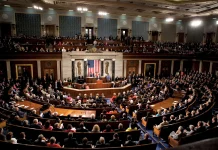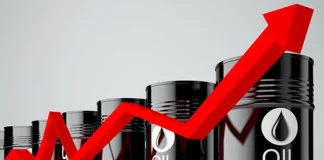On Wednesday, the naira strengthened against the US dollar on both the official and black markets. On the black market, the local currency saw a notable increase in value relative to the US dollar.
This occurred concurrently with the announcement of the Central Bank of Nigeria that all legitimate foreign exchange backlogs had been finalized, meeting a significant commitment made by Mr. Olayemi Cardoso, the apex bank governor, to handle an inherited backlog of $7 billion in claims.
Mrs. Hakama Sidi Ali, the Acting CBN Director of Corporate Communications, revealed this information in Abuja on Wednesday. She recalled that the central bank had just removed $1.5 billion from the backlogs.
Data gathered from sources indicates that on Wednesday, the naira concluded trading at 1,410/dollar at the parallel market and N1,492 at the official Nigerian Autonomous Foreign Exchange Market. Findings show that the exchange rate has been rising recently as speculators start selling off their dollar stocks due to a decline in prospective buyer demand brought on the CBN clampdowns.
The Central Bank of Nigeria has issued a number of circulars in recent weeks and months that have assisted in sealing leaks and closing doors that had previously been exploited by money speculators and racketeers. The Economic and Financial Crimes Commission agents’ recent crackdowns on the operations of illicit BDC operators in Lagos, Abuja, and Kano have also contributed to a decrease in currency volatility.
A Bureau De Change Operator at Wuse 2, Abuja, Ibrahim Yahu, said on Wednesday that the greenback was bought at the rate of N1400/$1 and sold at N1500/$, allowing operators to make a spread of N100/$1. He said, “The highest I can buy from you is N1400/$ but we are selling at N1500/$. He noted that some persons bought at the rate N1,300/$ during the daily trading activity.
Another currency trader, Malam Musa Yahyah, at the Central Business District in the FCT, expressed mixed feelings about the new rate, stating that some traders were forced to sell at loss due to a waning demand for the greenback.
In Lagos, a currency trader at Allen Avenue, Ikeja, Mustafa Ibrahim, said the waning demand for the dollar, partly driven by the commencement of dollar sale to BDC operators at the rate of 1,300/dollar, had further weakened demand for the greenback.
He said most traders bought and sold the dollar at N1350 and N1450 on Wednesday. According to Ibrahim, the local currency may reach a new high of 1,200/dollar in weeks if the trend continues.
Also, Mallam Abubakar Salisu, who sells FX at the Murtala Muhammed Airport, Lagos, said the naira-dollar exchange rate at the parallel market had been fluctuating in recent times due to the activities of the CBN and the EFCC.
“As of today, many of us bought and sold at 1,400/dollar and N1,450/dollar. The rate is still volatile but many of us are anxious to sell because we know the dollar will soon crash. The only challenge is that many us bought the FX when the rate was around N1,600, so we are concerned about the loss. We are seeking to minimise the loss,” he said.
Meanwhile, the intraday high closed at N1,620 per dollar for the spot on Tuesday while the intraday low closed at N1,350/$1 on the same day. The daily foreign exchange market turnover increased to $268.29m from $195.13 million recorded on Tuesday. On Tuesday, forex turnover at the official foreign exchange market increased to $11.43bn within two months of trading, following fresh reforms by the CBN.
An analysis of reports and data of daily forex transactions recorded on the website of FMDQ Securities, a platform that publishes official foreign exchange trading in the country, indicated that the figure increased by 185.75 per cent or $7.43bn between January and March 15th, 2024.
The improved liquidity at NAFEM followed a directive by the CBN on February 1, 2024, asking banks to sell their excess dollar stock to improve liquidity in the FX market within 24 hours.
The naira has continued to appreciate against the dollar following some foreign exchange measures put in place by the Central Bank of Nigeria.
Some of the FX reforms include efforts made at achieving a willing buyer-willing seller market; removal of all limits on margins for the International Money Transfer Operator remittances; introduction of a two-way quote system and the broad reforms in the Bureau De Change segment of the market to restore stability, enhance transparency, boost of supply, and promote of price discovery in the Nigeria Autonomous Foreign Exchange Market.
The pressure on the naira/dollar exchange rate is beginning to ease as Nigeria’s external reserves have sustained growth in one month.
Data from the CBN showed that the foreign currency reserves increased by 3.62 per cent to $34.37bn as of March 12, 2024 from $33.17bn recorded at the beginning of February 2024.
The CBN recently announced a remarkable upswing in Diaspora remittances, soaring by 433 per cent to reach $1.3b in February, compared to $300m in January.the exchange rate has been gaining lately as speculators begin to dump their dollar stocks, following waning demand by prospective buyers amid CBN clampdowns.
A string of circulars by the Central Bank of Nigeria in recent weeks and months have helped to plug leakages and blocked loopholes previously explored by currency speculators and racketeers.
Also, the recent clampdowns on the activities of illegal BDC operators in Lagos, Abuja and Kano by the operatives of the Economic and Financial Crimes Commission have helped to reduce the volatility of the naira.
A Bureau De Change Operator at Wuse 2, Abuja, Ibrahim Yahu, said on Wednesday that the greenback was bought at the rate of N1400/$1 and sold at N1500/$, allowing operators to make a spread of N100/$1.
He said, “The highest I can buy from you is N1400/$ but we are selling at N1500/$. He noted that some persons bought at the rate N1,300/$ during the daily trading activity. Another currency trader, Malam Musa Yahyah, at the Central Business District in the FCT, expressed mixed feelings about the new rate, stating that some traders were forced to sell at loss due to a waning demand for the greenback.
In Lagos, a currency trader at Allen Avenue, Ikeja, Mustafa Ibrahim, said the waning demand for the dollar, partly driven by the commencement of dollar sale to BDC operators at the rate of 1,300/dollar, had further weakened demand for the greenback. He said most traders bought and sold the dollar at N1350 and N1450 on Wednesday. According to Ibrahim, the local currency may reach a new high of 1,200/dollar in weeks if the trend continues.
Also, Mallam Abubakar Salisu, who sells FX at the Murtala Muhammed Airport, Lagos, said the naira-dollar exchange rate at the parallel market had been fluctuating in recent times due to the activities of the CBN and the EFCC.
“As of today, many of us bought and sold at 1,400/dollar and N1,450/dollar. The rate is still volatile but many of us are anxious to sell because we know the dollar will soon crash. The only challenge is that many us bought the FX when the rate was around N1,600, so we are concerned about the loss. We are seeking to minimise the loss,” he said.
Meanwhile, the intraday high closed at N1,620 per dollar for the spot on Tuesday while the intraday low closed at N1,350/$1 on the same day.
The daily foreign exchange market turnover increased to $268.29m from $195.13 million recorded on Tuesday. On Tuesday, forex turnover at the official foreign exchange market increased to $11.43bn within two months of trading, following fresh reforms by the CBN.
An analysis of reports and data of daily forex transactions recorded on the website of FMDQ Securities, a platform that publishes official foreign exchange trading in the country, indicated that the figure increased by 185.75 per cent or $7.43bn between January and March 15th, 2024.
The improved liquidity at NAFEM followed a directive by the CBN on February 1, 2024, asking banks to sell their excess dollar stock to improve liquidity in the FX market within 24 hours. The naira has continued to appreciate against the dollar following some foreign exchange measures put in place by the Central Bank of Nigeria.
Some of the FX reforms include efforts made at achieving a willing buyer-willing seller market; removal of all limits on margins for the International Money Transfer Operator remittances; introduction of a two-way quote system and the broad reforms in the Bureau De Change segment of the market to restore stability, enhance transparency, boost of supply, and promote of price discovery in the Nigeria Autonomous Foreign Exchange Market.
The pressure on the naira/dollar exchange rate is beginning to ease as Nigeria’s external reserves have sustained growth in one month. Data from the CBN showed that the foreign currency reserves increased by 3.62 per cent to $34.37bn as of March 12, 2024 from $33.17bn recorded at the beginning of February 2024. The CBN recently announced a remarkable upswing in Diaspora remittances, soaring by 433 per cent to reach $1.3b in February, compared to $300m in January.












